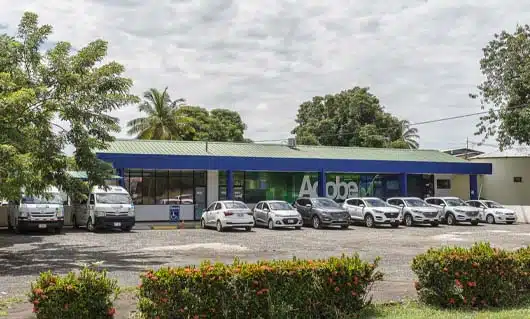Discover the freedom to explore Costa Rica at your own pace by renting a car. Renting a car in Costa Rica offers flexibility and allows for exploration at your own pace. Requirements include a valid driver’s license, a minimum age of 21, a credit card, insurance, an additional driver, a reservation in advance, a vehicle condition inspection, and a valid passport. It’s recommended to book online for the best rates and to have a valid passport for identification. For more clarification on renting a car, the cost, and guidelines on how to go about it, you can read this article further.
Renting A Car In Costa Rica
Renting a car in Costa Rica can be a convenient and flexible way to explore the country. It allows you to travel at your own pace and visit remote areas that may not be easily accessible by public transportation. To rent a car in Costa Rica, you need to fulfill certain requirements, which will be listed below.
Requirements for Renting a Car in Costa Rica
#1. Driver’s License
You will need a valid driver’s license from your home country. An international driver’s license is not required, but it can be useful as an additional form of identification.
#2. Minimum Age
The minimum age to rent a car in Costa Rica is usually 21 years old. However, some rental companies may require drivers to be at least 25 years old.
#3. Credit Card
Most car rental companies in Costa Rica require a credit card for the reservation and as a deposit for any potential damages. Make sure to have a credit card in the driver’s name available when renting a car.
#4. Insurance
Car rental insurance is mandatory in Costa Rica. The rental companies typically offer different types of insurance coverage, including third-party liability insurance and collision damage waivers (CDW). It is important to carefully review the insurance options and understand the coverage provided.
#5. Additional Driver
If you plan to have multiple drivers, each driver will need to meet the age and license requirements and be listed as an additional driver on the rental agreement. Some rental companies may charge an additional fee for each additional driver.
#6. Reservation
It is recommended to book your rental car in advance, especially during peak travel seasons, to ensure availability and secure the best rates. Online booking platforms and rental car comparison websites can help you find the best deals.
#7. Vehicle Condition
Before accepting the rental car, thoroughly inspect it for any existing damages and make sure they are documented. This will help avoid disputes when returning the vehicle.
#8. Valid Passport
It’s advisable to have a valid passport as a form of identification when renting a car in Costa Rica.
#9. Driving Experience
Some rental companies may have specific requirements regarding the minimum driving experience of the primary driver, typically a minimum of one or two years of driving experience.
#10. Understanding Rental Terms and Conditions
It’s crucial to carefully read and understand the rental terms and conditions provided by the rental company. This includes information about mileage limits, fuel policies, late return fees, and any other specific rules or restrictions.
Renting A Car In Costa Rica Liberia Airport
When renting a car at Liberia Airport in Costa Rica, there are several things to be aware of. They include
#1. Car Rental Counters
Liberia Airport has car rental counters inside the airport, where you can find both international and local car rental companies. International companies like Budget, Enterprise, and Alamo have counters at the airport.
#2. Booking in Advance
It is recommended to book your car rental in advance, especially during peak travel seasons, to ensure availability and secure the best rates.
#3. Meeting the Rental Agent
If you decide to book a car, the rental company will provide instructions on where to meet their agent to take you to their airport office location to collect your car.
#4. Insurance Requirements
Car rental insurance is mandatory in Costa Rica. It is important to carefully review the insurance options offered by the rental company and understand the coverage provided. Please note that liability insurance purchased on third-party travel websites and insurance that accompanies US credit or debit cards may not be acceptable forms of coverage.
#5. Additional Fees
Some rental companies may charge additional fees for services such as additional drivers or GPS navigation systems. It is advisable to inquire about any potential additional fees when making your reservation.
#6. Road Conditions
Many countryside roads in Costa Rica can be narrow, winding, and challenging to navigate. Exercise caution when driving, especially around curves and when passing trucks.
#7. Deposit
Rental car companies may require a deposit when renting a car at Liberia Airport in Costa Rica. It is advisable to ask your credit card company about the deposit amount and any particular restrictions on the coverage offered.
#8. Meet and Greet Shuttle
Some rental companies, like Adobe Rent a Car, offer a complimentary meet-and-greet shuttle service. An agent will meet you outside the airport terminal and take you to their office to complete the rental agreement and collect the car.
#9. Vehicle Condition
Before accepting the rental car, it is recommended to thoroughly inspect it for any existing damages and make sure they are documented. This will help avoid disputes when returning the vehicle.
#10. Reviews and Recommendations
Reading reviews and recommendations from other travelers can provide insights into their experiences with car rental companies at Liberia Airport.
Renting A Car In Costa Rica Insurance
Car rental insurance is mandatory in Costa Rica. It is important to understand the different types of insurance coverage available and what they include. When renting a car in Costa Rica, there are several types of insurance that you may encounter. They include
#1. Mandatory Liability Insurance
In Costa Rica, liability insurance is mandatory and provided by the government-owned insurance company, Instituto Nacional de Seguros (INS). This insurance covers damages to third parties in the event of an accident.
#2. Collision Damage Waiver (CDW)
CDW is an optional insurance policy that covers damages to the rental car in case of an accident or theft. It is recommended to have CDW coverage, as it can help protect you from significant financial liabilities.
#3. Supplemental Liability Insurance (SLI)
SLI is an additional insurance option that provides higher coverage limits for liability claims. It is also optional but can provide extra peace of mind.
#4. Credit Card Coverage
Some credit cards offer rental car insurance coverage, but it is important to check the terms and conditions of your specific credit card to understand the extent of coverage provided. Nevertheless, credit card coverage may not be sufficient to meet the mandatory insurance requirements in Costa Rica.
#5. Personal Accident Insurance
Personal Accident Insurance covers medical expenses for injuries sustained by the driver and passengers in the rental car. It is an optional coverage that you can consider based on your needs.
#6. Roadside Assistance
Roadside assistance coverage provides services such as towing, flat tire assistance, and lockout assistance in case of emergencies. It can be beneficial to have this coverage for added peace of mind.
#7. Damage Supplement
Damage supplement is another type of insurance that can be offered by rental car agencies. Beyond what the standard CDW covers, it offers additional coverage for damage to the rental car.
#8. Theft Protection
This insurance covers the theft of the rental car. It is also optional but may be worth considering, especially if you plan to visit urban areas.
#9. Full Coverage
Full coverage is a term used by rental car agencies in Costa Rica to encompass multiple types of insurance, including liability insurance, collision damage waivers (CDW), theft protection, and more. It provides comprehensive coverage for the rental car.
#10. Vandalism Supplement
Some rental car agencies offer a vandalism supplement as an additional insurance option. This coverage protects against damage caused by vandalism to the rental car.
Cost Of Renting A Car In Costa Rica
The cost of renting a car in Costa Rica is the amount of money you will need to pay for renting a car for a specific period of time.
Factors Affecting The Cost Of Renting A Car In Costa Rica
#1. Average Rental Car Cost
The average cost to rent a car in Costa Rica is around $142 per day. However, prices can vary depending on factors such as the rental company, type of car, duration of rental, and the time of year.
#2. Cheapest Rental Car Price
The cheapest rental car in Costa Rica can start as low as $9 per day for a Nissan March. Keep in mind that prices may vary depending on availability and demand.
#3. Additional Costs
In addition to the base rental cost, there may be additional costs to consider. These can include insurance fees, government license plate fees (around $1.50 per day), and any optional extras such as GPS rental or additional driver fees.
#4. Seasonal Price Variations
The cost of renting a car in Costa Rica can vary depending on the time of year. Peak travel seasons, such as holidays and high tourist seasons, may have higher rental prices compared to off-peak seasons.
#5. Comparison Shopping
It is advisable to compare prices from different rental car companies and booking platforms to find the best deal. Online platforms like Discover Card, Kayak, and Momondo can help you compare prices and find competitive rates.
#6. Insurance Costs
The cost of insurance can vary depending on the type and level of coverage you choose. Insurance can range from $15 to $75 per day. It is important to carefully review the insurance options provided by the rental company and understand the coverage and associated costs.
#7. Total Cost Calculation
When considering the cost of renting a car in Costa Rica, it is important to factor in the base rental cost, insurance fees, additional fees, and any applicable taxes. This will give you a more accurate estimate of the total cost of renting a car.
#8. Rental Rates
The rental rates for cars in Costa Rica can vary depending on factors such as the type of car, the rental duration, and the rental company. Rates can range from around $25 to USD 70 per day, with an average cost of approximately $50 per day.
Renting A Car In Costa Rica Advice
Renting a car in Costa Rica can provide you with the freedom to explore the country at your own pace. By understanding the insurance requirements, considering the best time to rent, and following driving tips, you can have a smooth and enjoyable experience.
Tips for Renting and Driving in Costa Rica
Renting and driving a car in Costa Rica can be a great way to explore the country at your own pace. Here are some tips to keep in mind:
#1. Renting a Car
When renting a car in Costa Rica, it’s important to do your research and compare prices from different rental companies. Consider using a rental car platform like Discover Cars, which includes the mandatory insurance required by the Costa Rican government in their quotes.
#2. Insurance
Make sure you understand the insurance requirements when renting a car in Costa Rica. The Costa Rican government mandates mandatory insurance coverage for rental cars. It’s recommended to carefully review the insurance policies offered by rental car companies to ensure you have adequate coverage.
#3. Best Time to Rent
Consider renting a car during the low season or shoulder season when demand is lower. This can help you secure better deals and avoid higher prices during peak tourist seasons.
#4. 4-Wheel Drive (4WD)
The decision to rent a car with 4WD depends on the specific areas you plan to visit. While 4WD can be beneficial for navigating rough terrains and unpaved roads, it may not be necessary for all destinations. Evaluate your itinerary and the road conditions you expect to encounter before deciding on 4WD.
#5. Driving Conditions
Be aware that road conditions in Costa Rica can vary, ranging from well-maintained highways to narrow and winding mountain roads. It’s important to drive cautiously and be prepared for different road conditions. Consider using a GPS or navigation app to help you navigate unfamiliar roads.
#6. Traffic and Driving Habits
Traffic in urban areas can be congested, and driving habits may differ from what you’re accustomed to. Stay alert, follow traffic rules, and be patient on the road. It’s also advisable to familiarize yourself with local driving customs and etiquette.
#7. Fill up on Fuel
Gas stations can be sparse in some areas of Costa Rica, especially in remote locations. It’s recommended to fill up on fuel whenever you have the opportunity, especially before embarking on longer journeys.
#8. Drive During Daylight Hours
If possible, try to drive during daylight hours, especially if you are not familiar with the roads or driving conditions. It can be easier to navigate and spot potential hazards during the daytime.
#9. Be Cautious of Wildlife
Costa Rica is known for its rich biodiversity, and it’s not uncommon to encounter wildlife on the roads. Be cautious and drive at a reasonable speed, especially in rural areas and near national parks.
#10. Use Parking Attendants
In busy urban areas, parking attendants may offer to watch your car for a small fee. Using their services can provide an added layer of security and peace of mind.
Is It A Good Idea To Rent A Car In Costa Rica?
Renting a car in Costa Rica can be a good idea if you value flexibility, independence, and the ability to explore remote areas or national parks. It can be cost-effective and convenient, especially for groups or travelers with multiple destinations. However, it’s important to consider road conditions, driving experience, insurance requirements, and additional costs. Alternatives like public transportation may also be worth considering. Ultimately, the decision depends on your preferences, itinerary, and comfort level with driving in unfamiliar conditions.
What Does It Cost To Rent A Car In Costa Rica?
The cost of renting a car in Costa Rica varies depending on factors such as the rental company, car type, rental duration, and time of year. On average, it can be around $142 per day, with prices ranging from $40 to $55 per day for a small SUV. During the low season, prices can be around $250 per week. It’s important to compare prices, consider mandatory insurance, and book in advance for better deals.
Can A Foreigner Lease A Car In Costa Rica?
Foreigners can lease a car in Costa Rica, but there may be certain requirements and restrictions. However, foreigners may need to establish temporary resident status to comply with Costa Rica’s transportation and circulation requirements. Nevertheless, it’s important to note that leasing a car may not be as common as renting or buying a car in Costa Rica.
Is It Easy To Drive A Car In Costa Rica?
Driving in Costa Rica can be manageable, but it’s important to consider the driving conditions, such as narrow and winding roads. Foreigners can drive with a valid driver’s license from their home country, and an international driver’s license is not required. It’s recommended to choose reputable rental car companies, follow safety precautions, and drive during the day. Familiarize yourself with local traffic laws and regulations, and be aware of the different types of fuel available at gas stations.
Can You Stay In Costa Rica Without A Car?
It is possible to stay in Costa Rica without a car. There are various transportation options available, such as public transportation (buses and taxis), private or shared shuttle services, in-country flights, walking, biking, and alternative transportation methods like hiring local drivers or using ride-sharing services. The availability and convenience of these options may vary depending on the specific location in Costa Rica.
How Much Is A Rental Car In Costa Rica For A Week?
The cost of renting a car in Costa Rica for a week can vary depending on several factors such as the type of car, the time of year, and the rental company. The average cost of a rental car in Costa Rica is around $19 per day or $122 per week. However, prices can fluctuate based on availability, insurance coverage, extras, taxes, fees, and other factors. It’s advisable to compare prices from different rental car companies and consider any additional costs, such as mandatory insurance when calculating the total expense.
Are Cars Expensive In Costa Rica?
Cars in Costa Rica can be relatively expensive compared to other countries, primarily due to high import taxes imposed by the Costa Rican government. On average, new cars and trucks in Costa Rica are about 25-30% more expensive than in the United States. Used cars, while more popular, are still more expensive than their counterparts in the United States. Additionally, maintaining a car in Costa Rica can be costly due to yearly registration fees, periodic roadworthy inspections, and expensive fuel.
Is Uber Available In Costa Rica?
Yes, Uber is available in Costa Rica. It officially launched in the country in 2015 and has become a popular transportation option for both locals and tourists. However, Uber operates in a legal gray area in Costa Rica. The Costa Rican government has not allowed ride-sharing or unlicensed taxi services in its legislation, but Uber continues to operate and the government collects taxes from the company. Uber is primarily available in major metropolitan areas such as San Jose, Liberia, and San Carlos. Availability may be more limited in other towns, and surge pricing may apply in certain areas.
Conclusion
Liberia Airport in Costa Rica offers car rental counters for international and local companies. Booking in advance is recommended for availability and best rates. Meeting the rental agent is advised. Seasonal price variations may apply. Renting a car in Costa Rica offers freedom to explore at your own pace. To ensure a smooth experience, research prices, understand insurance requirements, choose the best time to rent, choose a 4-wheel drive (4WD) for specific areas, and be prepared for varying road conditions, using GPS or navigation apps for guidance.
- RENTING A CAR WITH A DEBIT CARD: The Ultimate Guide
- LUXURY CAR RENTALS LOS ANGELES IN 2024
- HOW TO START A CAR RENTAL BUSINESS: Step-By-Step Guide
- WHERE ARE THE BEST RENTAL CAR DEALS?
- HOW TO GET A CHEAP CAR RENTAL: The Ultimate Guide






